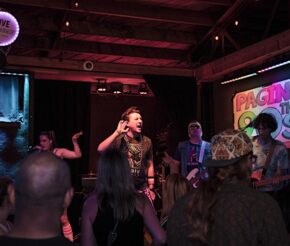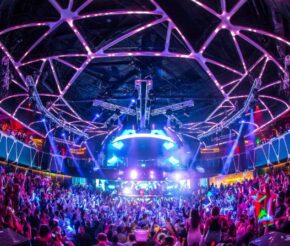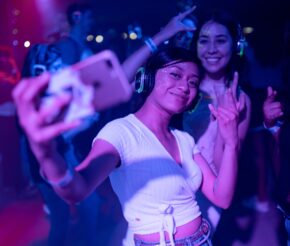- Advertise
-
Subscribe
No Pics, No Problems

‘No mobiles on the dancefloor: it kills the vibe and makes you look like a boring bastard’. That’s how one Berlin nightclub puts it on a now viral sign.
And they’re not alone in their distaste for mixing clubbing with cell phones.
The Berghains and KitKat Clubs of this world are famous for their strict censuring of amateur club photography – a symptom of a phone-obsessed world in which everything you do has to be documented or it didn’t happen.
The absence of surveillance has a massive impact on the way we act
But it goes deeper than that. ‘No Phone’ and ‘No Photo’ policies aren’t just about fighting the modern-day simulacrum that is living through a screen which substitutes reality for a glorified representation of itself.
In fact, studies show that the absence of surveillance has a massive impact on the way we act. Putting the camera away for a night has a bigger influence on our actions than we might have thought, especially in a clubbing context.
Firstly, there’s the authority effect: surveillance encourages conformity.
Research from psychologists such as Govern and Marsch (2001), Van Rompay (2009), and Bateson (2006), shows that when people feel watched, they’re more likely to change their behaviour in accordance with social norms.

A visible camera, mirror, or image of a pair of eyes was found to be enough to reduce littering in streets; encourage shoppers to put money in an ‘honesty box’ rather than take an item for free; and even help other people out if they see them in distress.
There’s a tonne of evidence in favour of the idea that feeling watched discourages people from acting in ‘antisocial’ or criminal ways. And this is precisely the reason why nightclubs are against it. Not everything you do in the darkened basement of a club is 100% kosher, is it?
Berghain is infamous for its drug-fuelled debauchery. About Blank (also in Berlin) is outspokenly anti-establishment in its values and activities.
At the latter, partygoers are asked on the door if they have Labour party values, and (if they can prove that they do) are greeted with an inclusive, fetish-friendly atmosphere that is liberal in every sense of the word.
‘No Photo’ policies allow clubbers to go against societal norms
In 2006, Berghain shot to international fame thanks to its notoriously fussy door selection and mysterious lack of social media presence – both of which got clubbers itching to be one of the elite few who actually knew what went on in there.

Aside from allowing clubbers to feel uninhibited in their sexual and narcotic endeavours, ‘No Photo’ policies also play an important role in allowing partygoers to express themselves in ways that go against restrictive and even discriminatory societal norms.
Tbilsi’s Bassiani has long been a safe space for Georgia’s LGBTQ+ community, coming under fire from right wing smear campaigns and police sanctions that demonstrate the country’s often antiquated attitude towards gay rights.
Unlike other clubs, the strict ‘No Phone’ policy implemented in Bassiani is a recognition of the need to protect clubbers’ privacy to create a safe haven for persecuted communities.
While for some venues, the mystery created by a ‘No Photo’ policy is more of a publicity stunt than a practical necessity.
Living through your IG story isn’t conducive to fostering connections
But the question still remains: can the element of mystery associated with ‘No Photo’ dancefloors actually improve the quality of your night, inhibitions (or lack thereof) aside? What if you aren’t someone whose night out endeavours would land them in trouble if they were papped and published?
You might be thinking that ‘No Photo’ policies only benefit the people who want to let loose without having to worry about being watched.
But you’d be wrong.

In fact, as broadcaster and DJ, Annie Mac, told Music Week, the clubbing scene is ‘not in a good way’ for anyone at present, in part due to partygoers’ ‘constant need for documentation’.
‘It just killed my fucking vibe’ she bemoaned, talking about the ‘constant phones in [her] face’ that she was confronted with throughout her ‘High 5’ tour last November.
And she’s not the only one.
Glasgow-based DJ, Jackmaster, took to Twitter to express a similar sentiment after a performance: ‘can u stop shoving phones in my face when I’m DJing please. Cheers’, the musician complained online.
Phones connect us across continents and timezones, but in practice, they’re actually pretty antisocial.
Living through your Instagram story isn’t conducive to fostering connections with the performers you’re listening to or the people around you.
If ‘the ultimate goal of clubbing is to connect’, as Annie Mac puts it, then the need to put on a show for your followers gets in the way of that, making you focus on how you appear instead of how you feel in the moment.
We need to get accustomed to rejecting the urge to live through screens
As Fabric club, London, joins the ever-growing list of ‘No Phone’ venues in the wake of its post-Covid reopening, it’s certainly worth asking whether the benefits of ‘No Photos on the Dancefloor’ policies are worth the sense of restriction they place on partygoers keen to have unprohibited fun.

‘We play music for dancing and encourage you to do the same. phone off, disco on!’
Fabric
Ultimately, the presence of flashing phone cameras has a huge psychological impact on the way we experience our nights out.
As the evidence in favour of ‘No Phone’ policies continues to grow, maybe we need to get accustomed to rejecting the urge to live our lives through screens – whether we like it or not.





